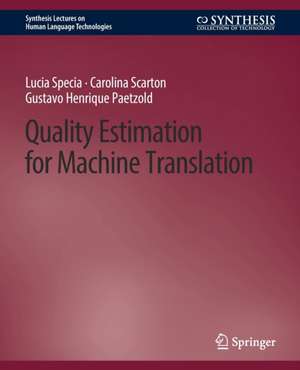Quality Estimation for Machine Translation: Synthesis Lectures on Human Language Technologies
Autor Lucia Specia, Carolina Scarton, Gustavo Henrique Paetzolden Limba Engleză Paperback – 25 sep 2018
Din seria Synthesis Lectures on Human Language Technologies
- 20%
 Preț: 223.34 lei
Preț: 223.34 lei - 20%
 Preț: 282.54 lei
Preț: 282.54 lei - 20%
 Preț: 277.60 lei
Preț: 277.60 lei - 20%
 Preț: 227.81 lei
Preț: 227.81 lei - 20%
 Preț: 227.29 lei
Preț: 227.29 lei - 20%
 Preț: 227.12 lei
Preț: 227.12 lei - 20%
 Preț: 274.48 lei
Preț: 274.48 lei - 20%
 Preț: 479.30 lei
Preț: 479.30 lei - 20%
 Preț: 224.65 lei
Preț: 224.65 lei - 20%
 Preț: 415.47 lei
Preț: 415.47 lei - 20%
 Preț: 357.06 lei
Preț: 357.06 lei - 20%
 Preț: 388.17 lei
Preț: 388.17 lei - 20%
 Preț: 226.64 lei
Preț: 226.64 lei - 20%
 Preț: 478.36 lei
Preț: 478.36 lei - 20%
 Preț: 224.50 lei
Preț: 224.50 lei - 20%
 Preț: 334.38 lei
Preț: 334.38 lei - 20%
 Preț: 225.99 lei
Preț: 225.99 lei - 20%
 Preț: 225.67 lei
Preț: 225.67 lei - 20%
 Preț: 166.43 lei
Preț: 166.43 lei - 20%
 Preț: 424.05 lei
Preț: 424.05 lei - 20%
 Preț: 358.95 lei
Preț: 358.95 lei - 20%
 Preț: 225.67 lei
Preț: 225.67 lei - 20%
 Preț: 227.12 lei
Preț: 227.12 lei - 20%
 Preț: 270.04 lei
Preț: 270.04 lei - 20%
 Preț: 537.06 lei
Preț: 537.06 lei - 20%
 Preț: 225.67 lei
Preț: 225.67 lei - 20%
 Preț: 228.13 lei
Preț: 228.13 lei - 20%
 Preț: 353.61 lei
Preț: 353.61 lei - 20%
 Preț: 227.12 lei
Preț: 227.12 lei - 20%
 Preț: 422.25 lei
Preț: 422.25 lei - 20%
 Preț: 270.69 lei
Preț: 270.69 lei - 20%
 Preț: 354.92 lei
Preț: 354.92 lei - 15%
 Preț: 519.19 lei
Preț: 519.19 lei - 20%
 Preț: 226.97 lei
Preț: 226.97 lei - 20%
 Preț: 384.53 lei
Preț: 384.53 lei - 20%
 Preț: 226.64 lei
Preț: 226.64 lei - 20%
 Preț: 503.01 lei
Preț: 503.01 lei - 20%
 Preț: 358.04 lei
Preț: 358.04 lei - 20%
 Preț: 330.75 lei
Preț: 330.75 lei - 20%
 Preț: 299.48 lei
Preț: 299.48 lei - 20%
 Preț: 228.28 lei
Preț: 228.28 lei - 20%
 Preț: 382.39 lei
Preț: 382.39 lei - 20%
 Preț: 418.59 lei
Preț: 418.59 lei - 20%
 Preț: 326.13 lei
Preț: 326.13 lei - 20%
 Preț: 271.86 lei
Preț: 271.86 lei
Preț: 327.95 lei
Preț vechi: 409.93 lei
-20% Nou
Puncte Express: 492
Preț estimativ în valută:
62.77€ • 68.21$ • 52.76£
62.77€ • 68.21$ • 52.76£
Carte tipărită la comandă
Livrare economică 21 aprilie-05 mai
Preluare comenzi: 021 569.72.76
Specificații
ISBN-13: 9783031010408
ISBN-10: 303101040X
Ilustrații: XIII, 148 p.
Dimensiuni: 191 x 235 mm
Greutate: 0.3 kg
Editura: Springer International Publishing
Colecția Springer
Seria Synthesis Lectures on Human Language Technologies
Locul publicării:Cham, Switzerland
ISBN-10: 303101040X
Ilustrații: XIII, 148 p.
Dimensiuni: 191 x 235 mm
Greutate: 0.3 kg
Editura: Springer International Publishing
Colecția Springer
Seria Synthesis Lectures on Human Language Technologies
Locul publicării:Cham, Switzerland
Cuprins
Preface.- Acknowledgments.- Introduction.- Quality Estimation for MT at Subsentence Level.- Quality Estimation for MT at Sentence Level.- Quality Estimation for MT at Document Level.- Quality Estimation for other Applications.- Final Remarks.- Bibliography.- Authors' Biographies.
Notă biografică
Lucia Specia is a Professor of Language Engineering in the Department of Computer Science at the University of Sheffield. Her research focuses on various aspects of data-driven approaches to multilingual language processing with a particular interest in multimodal context models for language grounding that has applications in machine translation, quality estimation, and text adaptation. She is the recipient of an ERC Starting Grant on multimodal machine translation (2016-2021) and has been involved in a number of other research projects on machine translation (EC FP7 QTLaunch-Pad and EXPERT, EC H2020 QT21 21, CRACKER) and EC H2020 text adaptation (SIMPATICO). Before joining the University of Sheffield in 2012, she was Senior Lecturer at the University of Wolverhampton (2010-2011) and research engineer at the Xerox Research Centre, France (2008–2009). She received a Ph.D. in Computer Science from the University of Sao Paulo, Brazil, in 2008.
Carolina Scarton is a Research Associate at the University of Sheffield and a member of the Natural Language Processing Group. She holds a Ph.D. on Quality Estimation of Machine Translation from the University of Sheffield (2017) and her research interests are quality estimation, text simplification, evaluation of NLP task outputs at the document level, and readability assessment. Currently, Dr. Scarton works for the EC H2020 SIMPATICO project, where she develops approaches for sentence simplification. Previously, she was a Marie Skłodowska-Curie Early Stage Researcher working for the EXPERT project on the topic of machine translation at the University of Sheffield (2013-2016).
Gustavo Henrique Paetzold is an Adjunct Professor at the Federal University of Technology - Parana. He holds a Ph.D. from the University of Sheffield (2016). His main research interests are text simplification, psycholinguistics, quality estimation, and machine learning applied to natural language processing. Prior to joining the Federal University of Technology, Dr. Paetzold worked as a Research Associate at the University of Sheffield on the EC H2020 SIMPATICO project, where he developed approaches for lexical simplification (2016-2018).
